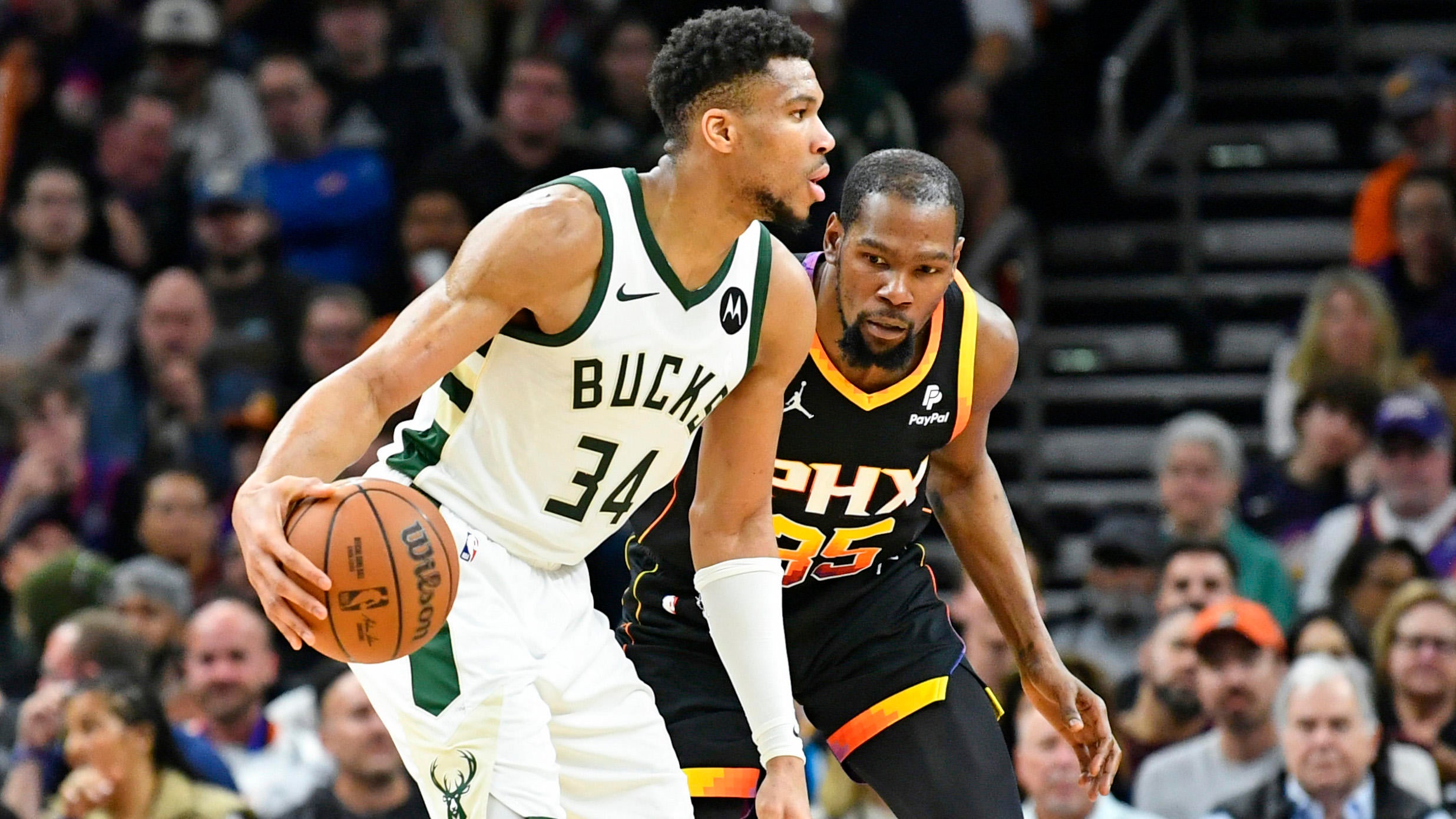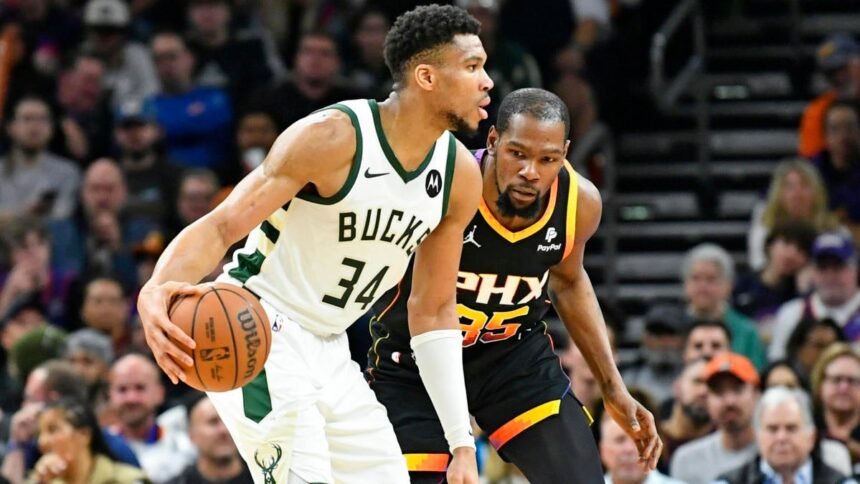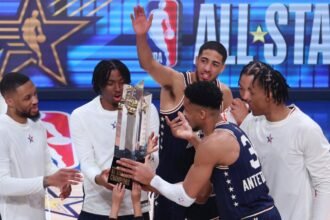
In June, the Houston Rockets made a trade that appeared, at least in theory, to be a prelude to a second, bigger one. When the Brooklyn Nets sent Mikal Bridges to the New York Knicks, they also looped in the Rockets and swapped control over a handful of future draft picks they owned originally belonging to the Phoenix Suns (and one from either the Nets or Dallas Mavericks) for control of their own picks back in 2025 and 2026. Those Nets picks, at least in the moment, looked like some of the most valuable draft assets in basketball.
But the Rockets, based on reporting at the time, held a specific interest in those Suns picks as a sort of short against Phoenix’s future. The Suns were coming off a disappointing first-round sweep and held limited flexibility to improve because they had traded most of their draft picks and were above the second apron. As ESPN’s Adrian Wojnarowski reported at the time, the Rockets wanted to be in a position to give Phoenix its own draft picks back and, with them, the ability to tank and rebuild had they ever decided to trade Kevin Durant or Devin Booker. Phoenix has thus far resisted all overtures, but as recently as Sunday, Marc Stein called Durant Houston’s “dream target.” While Stein also reported a widespread belief around the league that the Rockets want to wait until the offseason to make a big trade, even having a dream target suggests a willingness to jump should the right star become available.
And that made The Athletic’s Kelly Iko’s reporting on Wednesday so confusing. While he’s not as versatile as Durant, Giannis Antetokounmpo, at least on paper, feels like much more of a dream target for a team ready to swing a blockbuster than Durant is. Antetokounmpo is more than six years younger than Durant and has beaten him in MVP voting a staggering eight years in a row. Virtually every metric tells us that Antetokounmpo is the superior player today. Last season, for instance, Antetokounmpo more than doubled Durant up in terms of BPM (9.0 to 4.0), came close in VORP (7.2 to 4.3) and Win Shares per 48 minutes (.246 to .129). Antetokounmpo has had a few minor injuries but has never missed 20 games in a season. Durant has done so in four of the past five seasons.
Yet, according to Iko, the Rockets are not interested in breaking up their young core to land Antetokounmpo in a trade should the flailing Bucks ever decide to move him. It’s a confusing stance on the surface because, well, who wouldn’t want Giannis? He has a real case for the title “Best player in the NBA, not named Nikola Jokic.” He’s a tricky fit on certain rosters, sure, but he’s good enough to warrant further changes. If your team doesn’t make sense for a two-time MVP in his prime, your team is the problem, not him. So what’s happening here?
Let’s race through the simplest answers here. This might just be posturing. It’s easier to trade for a player when their current team doesn’t think you’re desperate. Ask the Los Angeles Clippers what happens when you really are desperate to land a specific player. It’s also possible that there isn’t an organizational consensus. ESPN’s Tim MacMahon said as much in regards to the Durant interest in July during an appearance on the Lowe Post podcast. It’s possible, for instance, that Durant is a favored target of head coach Ime Udoka, who was an assistant in Brooklyn when Durant was a Net and reportedly the 2014 MVP’s preferred choice to replace Steve Nash in 2022. But the organization needs alignment for a trade of this magnitude to take place. If that’s not there, it’s hard to imagine Houston breaking the bank for anyone.
But the logical answer here has less to do with Antetokounmpo, Durant, Booker or any player on another team’s roster and more to do with what Houston already has. The Rockets, in short, don’t quite know what they have yet.
It’s still early, but the 2024-25 Rockets look like a playoff team. They are 11-5 with a plus-8.5 net rating. Ironically, a missed out of bounds call on Antetokounmpo is the only thing keeping them out of a three-way tie with the Golden State Warriors and Oklahoma City Thunder for the Western Conference’s No. 1 seed. And they’ve done this, amazingly, without an obvious All-Star-caliber player. Alperen Sengun made a real run at a selection a year ago, but his scoring numbers have declined meaningfully. Nobody on the roster is averaging 20 points. Meanwhile, five of the seven players that represent the core of this year’s rotation are 23 or younger. That doesn’t include No. 3 overall pick Reed Sheppard or the promising 20-year-old Cam Whitmore. The Rockets have so much talent right now that they can’t even find playing time for everyone.
That’s a good problem to have, but it’s a problem nonetheless, and one that impacts the Rockets on several levels. On a practical level, it’s impossible to pay everyone. Houston has managed its finances very well. Next summer, for example, both Jalen Green and Sengun are set to kick off expensive new rookie deals. The Rockets are prepared for that, though, because they can clear almost $53 million off of their books just by declining Fred VanVleet’s team option and waiving the non-guaranteed Jock Landale. A rookie extension for Amen Thompson would kick in right as Dillon Brooks‘ four-year deal expires. One for Sheppard would kick in right as Green’s rookie extension ends. Rafael Stone is one of the best cap strategists in basketball. That doesn’t make the aprons any more forgiving.
This informs the logic of a consolidation trade as much as the talent upgrade would. Superstar salaries are capped through max contracts. Antetokounmpo, for instance, is making less this season than Khris Middleton and Brook Lopez combined. Any team would rather have Antetokounmpo, but paying multiple high-level players is almost always going to be more expensive than paying one great one. Those sub-star level players create a death-through-depth scenario where a team has no great players and is capped with expensive good ones.
The Rockets have years before that would become a real problem, but in a perfect world, they’d likely prefer to sidestep it entirely. One of the benefits of playing all of this youth right now, before landing a big-name veteran, is that it gives those young players to create an organic hierarchy. If there’s a budding star in the mix here, he has room to prove it. Right now, the Rockets are still figuring out which of these young players they need to prioritize and, perhaps just as importantly, which ones make sense next to whichever stars they might one day target.
That is no guarantee that they will ever choose to do so. The Rockets are playing so well right now that there are certain scenarios in which they decide to simply let it ride with this group, use those Suns picks to add cheap upside down the line and call it a day. One of the benefits of winning this much with such a young team is that it makes such a scenario plausible. One day, the Rockets may determine that they don’t have a superstar in this group and need to trade for one. Today? Their record alone creates more leverage than media posturing ever could. They don’t have to trade for Durant or Antetokounmpo or anyone else right now. They can afford to be patient and choosy, a luxury they didn’t have at the bottom of the standings.
If Antetokounmpo did become available, it would be irresponsible of the Rockets not to at least check in. The wording of Iko’s reporting is that Houston isn’t interested in breaking up its young core for Antetokounmpo, not that it isn’t interested in trading for him at all. Right now, the Rockets are figuring out who exactly their young core is, and given how much incumbent talent, youth and draft capital there is here, it’s entirely plausible that the Rockets could construct a future star trade that doesn’t cost them everything they’ve already built. That, in all likelihood, is the goal here: to build on what’s happening now, not to tear it down for the first big name that hits the market.
Looking for more NBA insight from CBS Sports? Bill Reiter, John Gonzalez and more experts break down the league daily on the Beyond the Arc podcast.






